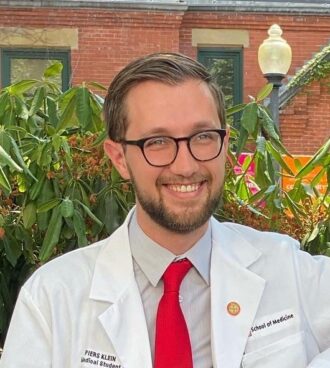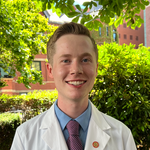Research news
New Publications – Depression and Anxiety Among English and Spanish-Speaking Patients with Breast Cancer Receiving Radiation Therapy

Congratulations to medical students Corina Beiner and Jenny Zhao on the acceptance of manuscript “Depression and Anxiety Among English and Spanish-Speaking Patients with Breast Cancer Receiving Radiation Therapy” into the International Journal of Radiation Oncology, Biology and Physics, and thanks to Dr. Ariel Hirsch for her mentorship of the students.

This research that Corina was awarded the ASCO Conquer Cancer Award for Underrepresented in Medicine (URiM) Medical Students and Jenny continued the work as part of the medical student summer research program. Read more about it here.
My research – Interventional treatment of cerebrovascular disease

Piers Klein is working under the mentorship of Dr. Thanh Nguyen and Dr. Mohamad Abdalkader in the departments of Neurology and Radiology at Boston Medical Center and the Chobanian & Avedisian School of Medicine. His research focuses on the epidemiology, diagnosis, medical and interventional treatment of cerebrovascular disease. Stroke is a devastating and common form of cerebrovascular disease affecting more than 800,000 people per year in the United States. Endovascular therapy, in which catheters are introduced through the skin into the blood vessels and navigated to the brain for clot removal, has transformed stroke care over the past decade. Piers has been involved with multiple large multicenter collaborations that have yielded insight into optimal techniques in the use of endovascular therapy. The PLATO study, co-led by Boston University and Heidelberg University, demonstrated favorable outcomes for patients with occlusions of the posterior cerebral artery treated by endovascular therapy and suggested that a first-line stent-retriever technique may offer the most benefit. Analyses of the SVIN registry have confirmed the real-world benefit of endovascular therapy suggested by randomized trials, challenged the use of bridging tPA in patients receiving endovascular therapy, and supported the use of endovascular therapy in patients with COVID-19 and stroke.
Piers enrolled in the LEADS research track for medical students. Learn more about the LEADS research track and other research opportunities.
Medical Student Research Symposium—January 29th, 2024
The 2024 Medical Student Research Symposium is scheduled for January 29th, 2024. Please note this is a new date.
The event is scheduled in Hiebert and all medical students engaged in research are invited to present.
Robert A. Winn Clinical Investigator Pathway Program
The Robert A. Winn Clinical Investigator Pathway Program (Winn CIPP) for medical students is one of the program initiatives of the Robert A. Winn Diversity in Clinical Trials Award Program, a $114 million initiative funded by the Bristol Myers Squibb Foundation, Gilead Sciences, and Amgen. This national program is designed to increase diversity in clinical trials and transform the clinical research landscape.
Winn CIPP is a 6-week intensive and immersive summer service-learning externship that provides medical students (MD, MD/PhD, DO, DO/PhD) who are underrepresented in medicine (URiM) and/or from a disadvantaged background with opportunities to experience and participate in clinical research conducted in community-based clinical research settings (e.g., community health centers, safety net hospitals, clinical research organizations). The goal of the Winn CIPP is to expose medical students to career pathways in clinical research, particularly community-oriented research that is focused on increasing inclusion, equity, and diversity in the conduct of clinical and translational research. During the program, Winn CIPP Students will gain exposure to clinical research and acquire community engagement and leadership skills.
The 2024 Winn CIPP will take place during two 6-week program periods:
- Group 1: Monday, June 3rd – Friday, July 12th, 2024
- Group 2: Monday, June 10th – Friday, July 19th, 2024
In 2024, Winn CIPP Site Partners will be located in the following cities (cities are subject to change):
Atlanta, GA Chicago, IL
Los Angeles, CA Louisville, KY
New Orleans, LA New York, NY
Phoenix, AZ Richmond, VA
San Antonio, TX Seattle, WA
Stipend: Winn CIPP students receive a $7,500 stipend for their participation during the externship.
During the program, they learn the basics of clinical trials and work at community-based clinical research organizations to provide outreach, education, and engagement on clinical trials. Students will receive training in three areas:
- Clinical Research – Students gain clinical research exposure through engagement with clinical investigators in community-based clinical research organizations and academic medical centers.
- Community Engagement – Students develop team-based service-learning projects, in which they conduct short-term capacity-building interventions, such as community needs assessments or implement patient initiatives (education, outreach, and/or informational programs). Students will design and conduct their projects in collaboration with site supervisors.
- Leadership Development – Students are introduced to clinical research career development pathways and receive mentoring that supports their development of community-oriented clinical research leadership skills.
Due Date: January 8, 2024.
How to Apply: Students may apply through the following link.
Sponsor Contact: Desiree Vasquez, Program Manager at vasquezd4@vcu.edu or email general questions to WinnCIPP@vcu.edu.
Medical students interested in applying should contact Matt Layne to discuss about their applications and assistance our Proposal Development office can provide.
Matthew Layne, PhD
Assistant Dean for Research
mlayne@bu.edu
Do You Need Biostatistics Help?
Do you have a question related to biostatistics or data analysis? The Biostatistics, Epidemiology & Research Design Program (of CTSI) and the Data Science Core (DSC) have established biostats consulting sessions for medical students. Please discuss with your research mentor before sharing project information, and after the initial consultation, your mentor can discuss establishing additional analysis and project support.
- Biostatistics, Epidemiology & Research Design Program
Connect with Dr. Cabral and Dr. Weinberg, esteemed faculty in the Dept of Biostatistics, for personalized consulting sessions tailored to your needs. Request an individual session or drop into a virtual consultation every Tuesday, 12-1 PM. - Data Science Core
Faculty members of the Data Science Core (Chao Zhang, PhD; Ignaty Leshchiner, PhD; and Jinying Chen, PhD) are available for initial biostatistics consultations. See website for individual areas of expertise and contact info.
Introduction to Research Information
Slides from the Introduction to Research meeting on September 26th.
Meet with Wilkins Visiting Professor for Evans Day
Dr. Barbara Kahn, the Wilkins Visiting Professor for Evans Day on October 19th, will meet informally with students and postdocs at 4:00 pm in the Keefer Auditorium after her lecture on “A Novel Class of Signaling Lipids with Anti-inflammatory and Anti-diabetic Effects.”
Students and Fellows can RSVP via this registration link.
Cancer Care Delivery and Outcomes Research Fellowship
A Program for Medical Students from Backgrounds Traditionally Underrepresented in Medicine
Goal: To provide opportunity for intensive training in cancer population science for medical students who are from backgrounds traditionally underrepresented in medicine.
Program: The Fellowship will provide a one-year mentored training experience in research focused on cancer care delivery and outcomes. We specifically seek applicants who are from backgrounds that are traditionally underrepresented in medicine (URiM) in order to enhance diversity within the field and bring needed voices into population sciences research.
Students will spend one year (July 2024-June 2025) conducting mentored research within the Division of Population Sciences at Dana-Farber Cancer Institute (DFCI) in Boston, Massachusetts, a Harvard Medical School teaching hospital. Examples of potential areas of focus include cancer care quality, cancer care delivery, health communication, health equity, informatics, ethics, supportive care interventions, and palliative care, among other areas of interest of faculty. The year will start with the 7-week Program in Clinical Effectiveness at the Harvard School of Public Health in July and August, coursework that will help provide the student with a background in research methods. The student will then continue the program of research at DFCI. Based on interests identified at the time of application, the student will be guided toward an appropriate mentor who will provide research oversight and supervision. The mentor will work closely with the student to develop a research question and plan, to assist the student in carrying out the research project, and to facilitate dissemination of research findings through talks and publications upon completion. The goal will be for the student to complete a research project over the course of the year and gain experience in academic oncology as a career path.
An additional career mentor will be assigned to meet with the student regularly to provide academic and career guidance and to foster connections with others in the field.
The student will receive salary support as well as tuition for the Program in Clinical Effectiveness and a stipend for research costs. The student will have designated workspace within the Division and access to a computer.
We encourage students from medical schools across the US to apply.
Faculty Director: Jennifer Mack, MD MPH, Director of the Center for Outcomes and Policy Research and Associate Chief of the Division of Population Sciences, DFCI
Application Process: Interested students should send the following to Nicole Santangelo (Nicole_santangelo@dfci.harvard.edu) by November 14, 2023:
- A completed application
- A personal statement describing background and motivation to pursue the fellowship program (up to one page)
- A statement summarizing an interesting question in cancer care delivery and outcomes research and possible ways to answer it through research (up to ½ page)
- A medical school transcript
- Curriculum vitae
- A letter of recommendation
Note: The National Institutes of Health considers the following groups to be underrepresented in biomedical research:
- Individuals from racial and ethnic groups such as Blacks or African Americans, Hispanics or Latinos, American Indians or Alaska Natives, Native Hawaiians, and other Pacific Islanders
- Individuals with disabilities
- Individuals from disadvantaged backgrounds
- Women from the above backgrounds
Questions can be directed to: nicole_santangelo@dfci.harvard.edu
Medical Scholars Research Fellowship (MSRF)
The Physician-Scientist Support Foundation (PSSF) Medical Scholars Research Fellowship (MSRF) provides research opportunities and mentoring to students who aspire to become physician-scientists and are dedicated to making fundamental discoveries that improve health. The MSRF is a key component of PSSF’s mission to revitalize, grow and support the career pathway for physician-scientists. The fellowship supports one year of mentored, rigorous research training in fundamental biomedical research. All applicants must be nominated by the medical school dean. The medical school dean can nominate only one applicant in any competition year.
STIPEND AND ALLOWANCES: For the 2024 fellowship year, the total amount awarded to each Medical Student Fellow is $50,000. The annual stipend is $42,000. In addition to the stipend, the award includes an allowance of $8,000 for health insurance and travel expenses.
ELIGIBILITY: The MSRF is open to United States citizens and U.S. permanent residents only. Prior research experience is not required. Single-degree medical students interested in a dual career in research and patient care are eligible. Members of minority groups underrepresented in medicine and science are particularly encouraged to apply.
Applicants are responsible for selecting a research mentor at any academic or nonprofit research institution in the United States, except for a government laboratory. Research proposal preparation is a key component of the application process.
INTERNAL REVIEW PROCESS: Interested medical students should submit the following materials listed below via InfoReady Review by Monday, October 16, 2023 at 12 noon.
- Questions outlined in InfoReady Review application
- A brief statement (< 1 page single space) by the medical student describing their planned research. Citations can be on second page
- One-page personal statement by medical student explaining how the proposed experience will contribute to their future career, and what they want to achieve with an extra year in medical school for research
- Updated CV or Biosketch. The research statement, personal statement, and CV should be assembled into a single PDF for submission
- Letter of support submitted directly from the research mentor (not by the student)
A faculty committee will review proposals and select a nominee.
Due Dates:
- Internal due date for student’s documents: Monday, October 16, 2023 at 12 noon
- Mentor's letter of support: Monday, October 30, 2023 at 12noon
- Sponsor's due date: Thursday, January 11, 2024
If you have any questions about the application process or the program please contact:
Matthew Layne, PhD
Assistant Dean for Research
mlayne@bu.edu
New Publications—Pediatric provider burnout

Congratulations to Cameron Hill (M2) and co-authors for publishing a new study: "Pediatric Provider and Staff Burnout in Federally Qualified Community Health Centers", in the Journal of Ambulatory Care Management. This study provides important insights into the factors that contribute to burnout among pediatric providers and staff in Federally Qualified Community Health Centers (FQHCs). These findings encourage healthcare organizations to further implement actionable change to address burnout in their workforce.